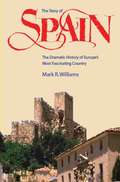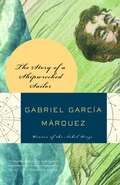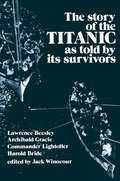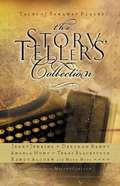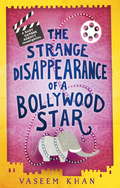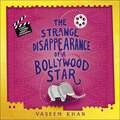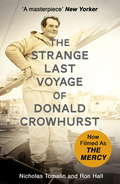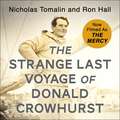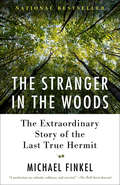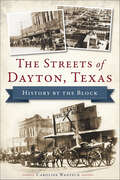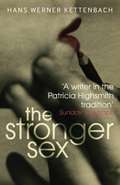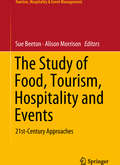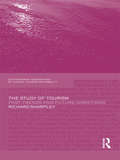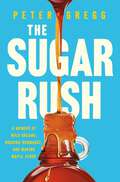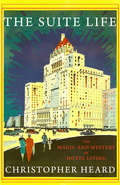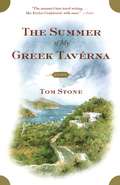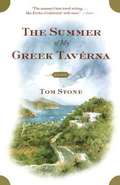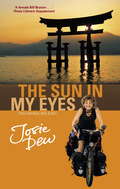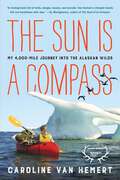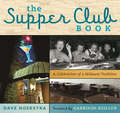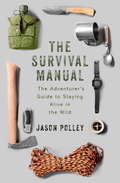- Table View
- List View
The Story of Spain: The Dramatic History of Europe's Most Fascinating Country (Second Edition)
by Mark R. WilliamsThe book is a popular history of Spain and the Spanish Empire from prehistoric times to the present day. It provides description and analysis of political, social, economic and cultural events over the centuries, which together shaped the history of this distinctive country. The book offers 60 illustrations and maps, including 16 pages of color photographs, as well as lists of historic places to visit at the end of each chapter. There is a dynastic chart, suggested readings, and index.
The Story of a Shipwrecked Sailor
by Gabriel García Márquez Randolph HoganTranslated by Randolf Hogan. In 1955, Garcia Marquez was working for El Espectador, a newspaper in Bogota, when in February of that year eight crew members of the Caldas, a Colombian destroyer, were washed overboard and disappeared. Ten days later one of them turned up, barely alive, on a deserted beach in northern Colombia. This book, which originally appeared as a series of newspaper articles, is Garcia Marquez's account of that sailor's ordeal.
The Story of the Empire State Building (Cornerstones of Freedom)
by Patrick ClintonDescribes the planning and building of what was once the world's tallest building and examines how it fit into the growth of New York City.
The Story of the First Americans (Ancient Times #Book One)
by Suzanne Strauss ArtThis is the first of two volumes about Native Americans written for students in grades five through eight. <P><P> It begins with the first bands of nomads who crossed the land bridge from Asia during the last Ice Age and proceeds to describe how their descendants learned to adapt to a wide variety of natural environments. <P><P>Each of the six chapters focuses upon a particular geographical region and traces the better known cultures that evolved there from earliest times until about the 12th century AD.
The Story of the Titanic As Told by Its Survivors
by Jack WinocourWhat it was really like. Panic, despair, shocking inefficiency, and a dash of heroism. Two lengthy narratives by passengers who had a thorough knowledge of the sea and by members of the ship's crew. More thrilling than any fictional account. 26 illustrations.
The Storytellers' Collection: Tales From Faraway Places
by Melody CarlsonTravel to Paris, London, Moscow, Senegal, and beyond in this wonderful collection of short stories penned by your favorite authors! Best-selling contributors include Robin Jones Gunn, Jerry Jenkins, Neta Jackson, Karen Kingsbury, Tracie Peterson, Lauraine Snelling, and others. No passport required ... just a comfortable reading chair!
The Strange Disappearance of a Bollywood Star: Baby Ganesh Agency Book 3 (Baby Ganesh series #3)
by Vaseem KhanThe enchanting new Baby Ganesh Agency novel sees Inspector Chopra and his elephant sidekick investigating the dark side of Bollywood.Mumbai thrives on extravagant spectacles and larger-than-life characters.But even in the city of dreams, there is no guarantee of a happy ending. Rising star and incorrigible playboy Vikram Verma has disappeared, leaving his latest film in jeopardy. Hired by Verma's formidable mother to find him, Inspector Chopra and his sidekick, baby elephant Ganesha, embark on a journey deep into the world's most flamboyant movie industry.As they uncover feuding stars, failed investments and death threats, it seems that many people have a motive for wanting Verma out of the picture. And yet, as Chopra has long suspected, in Bollywood the truth is often stranger than fiction...See what everyone is saying about this brilliant read:'I am in love with this series.' Goodreads reviewer'First class read.' Amazon reviewer'I can honestly say that I struggle with 364 days of the year when I do not have a new Vaseem Khan book to read. ' Goodreads reviewer'A brilliant addition to the series' Amazon reviewer'I couldn't put it down... This is a real treasure of a book.' Goodreads reviewer
The Strange Disappearance of a Bollywood Star: Baby Ganesh Agency Book 3 (Baby Ganesh series)
by Vaseem KhanThe enchanting new Baby Ganesh Agency novel sees Inspector Chopra and his elephant sidekick investigating the dark side of Bollywood.Mumbai thrives on extravagant spectacles and larger-than-life characters.But even in the city of dreams, there is no guarantee of a happy ending. Rising star and incorrigible playboy Vikram Verma has disappeared, leaving his latest film in jeopardy. Hired by Verma's formidable mother to find him, Inspector Chopra and his sidekick, baby elephant Ganesha, embark on a journey deep into the world's most flamboyant movie industry. As they uncover feuding stars, failed investments and death threats, it seems that many people have a motive for wanting Verma out of the picture. And yet, as Chopra has long suspected, in Bollywood the truth is often stranger than fiction...(P)2017 Hodder & Stoughton Limited
The Strange Last Voyage of Donald Crowhurst: Now Filmed As The Mercy
by Ron Hall Nicholas Tomalin'A masterpiece.' New Yorker'Wholly riveting, brilliantly researched.' Evening Standard'A meticulous investigation into the seeds of disaster... fascinating, uncomfortable reading.' Sunday Times In 1968, Donald Crowhurst was trying to market a nautical navigation device he had developed, and saw the Sunday Times Golden Globe round the world sailing race as the perfect opportunity to showcase his product. Few people knew that he wasn't an experienced deep-water sailor. His progress was so slow that he decided to short-cut the journey, while falsifying his location through radio messages from his supposed course.Everyone following the race thought that he was winning, and a hero's welcome awaited him at home in Britain. But on 10 July 1968, eight months after he set off, his wife was told that his boat had been discovered drifting in mid-Atlantic. Crowhurst was missing, assumed drowned, and there was much speculation that this was one of the great mysteries of the sea. In this masterpiece of investigative journalism, Nicholas Tomalin and Ron Hall reconstruct one of the greatest hoaxes of our time. From in-depth interviews with Crowhurst's family and friends and telling excerpts from his logbooks, Tomalin and Hall develop a tale of tragic self-delusion and public deception, a haunting portrait of a complex, deeply troubled man and his journey into the heart of darkness.
The Strange Last Voyage of Donald Crowhurst: Now Filmed As The Mercy
by Ron Hall Nicholas Tomalin'A masterpiece.' New Yorker'Wholly riveting, brilliantly researched.' Evening Standard'A meticulous investigation into the seeds of disaster... fascinating, uncomfortable reading.' Sunday Times In 1968, Donald Crowhurst was trying to market a nautical navigation device he had developed, and saw the Sunday Times Golden Globe round the world sailing race as the perfect opportunity to showcase his product. Few people knew that he wasn't an experienced deep-water sailor. His progress was so slow that he decided to short-cut the journey, while falsifying his location through radio messages from his supposed course.Everyone following the race thought that he was winning, and a hero's welcome awaited him at home in Britain. But on 10 July 1968, eight months after he set off, his wife was told that his boat had been discovered drifting in mid-Atlantic. Crowhurst was missing, assumed drowned, and there was much speculation that this was one of the great mysteries of the sea. In this masterpiece of investigative journalism, Nicholas Tomalin and Ron Hall reconstruct one of the greatest hoaxes of our time. From in-depth interviews with Crowhurst's family and friends and telling excerpts from his logbooks, Tomalin and Hall develop a tale of tragic self-delusion and public deception, a haunting portrait of a complex, deeply troubled man and his journey into the heart of darkness.
The Strange Last Voyage of Donald Crowhurst: Now Filmed As The Mercy
by Ron Hall Nicholas Tomalin'A masterpiece.' New Yorker'Wholly riveting, brilliantly researched.' Evening Standard'A meticulous investigation into the seeds of disaster... fascinating, uncomfortable reading.' Sunday Times In 1968, Donald Crowhurst was trying to market a nautical navigation device he had developed, and saw the Sunday Times Golden Globe round the world sailing race as the perfect opportunity to showcase his product. Few people knew that he wasn't an experienced deep-water sailor. His progress was so slow that he decided to short-cut the journey, while falsifying his location through radio messages from his supposed course.Everyone following the race thought that he was winning, and a hero's welcome awaited him at home in Britain. But on 10 July 1968, eight months after he set off, his wife was told that his boat had been discovered drifting in mid-Atlantic. Crowhurst was missing, assumed drowned, and there was much speculation that this was one of the great mysteries of the sea. In this masterpiece of investigative journalism, Nicholas Tomalin and Ron Hall reconstruct one of the greatest hoaxes of our time. From in-depth interviews with Crowhurst's family and friends and telling excerpts from his logbooks, Tomalin and Hall develop a tale of tragic self-delusion and public deception, a haunting portrait of a complex, deeply troubled man and his journey into the heart of darkness.(P)2016 Hodder & Stoughton
The Stranger in the Woods: The Extraordinary Story of the Last True Hermit
by Michael FinkelNEW YORK TIMES BESTSELLER • The remarkable true story of a man who lived alone in the woods of Maine for 27 years, making this dream a reality—not out of anger at the world, but simply because he preferred to live on his own.&“A meditation on solitude, wildness and survival.&” —The Wall Street JournalIn 1986, a shy and intelligent twenty-year-old named Christopher Knight left his home in Massachusetts, drove to Maine, and disappeared into the forest. He would not have a conversation with another human being until nearly three decades later, when he was arrested for stealing food. Living in a tent even through brutal winters, he had survived by his wits and courage, developing ingenious ways to store edibles and water, and to avoid freezing to death. He broke into nearby cottages for food, clothing, reading material, and other provisions, taking only what he needed but terrifying a community never able to solve the mysterious burglaries. Based on extensive interviews with Knight himself, this is a vividly detailed account of his secluded life—why did he leave? what did he learn?—as well as the challenges he has faced since returning to the world. It is a gripping story of survival that asks fundamental questions about solitude, community, and what makes a good life, and a deeply moving portrait of a man who was determined to live his own way, and succeeded.
The Streets of Dayton, Texas: History By The Block (History & Guide)
by Caroline WadzeckThe history of Dayton, Texas, is memorialized at every street corner and intersection. Street signs throughout town bear the names of characters in Dayton's past, the people who helped the city become what it is today. They are war heroes, a governor, business leaders, developers and everyday men and women dedicated to making Dayton a better community. Descend the Old Spanish Trail that cuts through the center of town, and meet those who settled what once was a western wildness. Author Caroline Wadzeck examines and explains the history of many of the town's streets, preserving their contributions and legacy in Dayton history.
The Stronger Sex
by Anthea Bell Hans Werner KettenbachYoung lawyer Alex Zabel defends industrialist Herbert Klofft in a case for wrongful dismissal being brought against him by his former employee and mistress. She is thirty-four, he seventy-eight, a despot, now wheelchair bound and dying of cancer. Alex must deal with a hopeless case, his growing empathy with a repulsive client and his sexual attraction to Klofft's elderly wife.
The Study of Food, Tourism, Hospitality and Events: 21st-Century Approaches (Tourism, Hospitality & Event Management)
by Sue Beeton Alison MorrisonThis book elaborates upon, critiques and discusses 21st-century approaches to scholarship and research in the food, tourism, hospitality, and events trades and applied professions, using case examples of innovative practice. The specific field considered in this book is also placed against the backdrop of the larger question of how universities and other institutions of higher learning are evolving and addressing the new relationships between research, scholarship and teaching.
The Study of Tourism: Past Trends and Future Directions (Contemporary Geographies of Leisure, Tourism and Mobility)
by Richard SharpleyOver the last two decades, tourism has become firmly established as a recognized field of study and the focus of extensive academic research. There has been continual expansion in the provision of taught programmes at undergraduate and postgraduate level, dramatic developments in the tourism literature and a growing community of tourism academics. Despite this explosion in the study of tourism, however, it is still struggling to achieve wider academic legitimacy, it remains to some extent divorced from the industry upon which it is focuses and, even within its academic ranks, there remains uncertainty over its role and future direction. This volume aims to critically explore this paradoxical situation and to consider the future direction of the study of tourism. It charts the development of tourism as an area of study, analyzing approaches taken from an international context; it critiques contemporary epistemologies of tourism framed around the social science vs. management dichotomy and offers alternative approaches to the study of tourism. In doing so, it engages directly with a range of important academic debates: what tourism ‘is’ in an academic context, the purpose of studying tourism and how it should be studied in the future. This important and stimulating volume will have global appeal to higher level students, academics and researchers within tourism and related disciplines.
The Sugar Rush: A Memoir of Wild Dreams, Budding Bromance, and Making Maple Syrup
by Peter GreggFilled with humor and madcap adventure, The Sugar Rush is the story of two friends with a sweet, golden, syrupy dream, set against the rugged New England wilderness.Trying to shake off the emotions of a recently emptied nest and midlife anxiety, Peter Gregg launches into a strange new chapter—he decides to make maple syrup. A lot of it. After recruiting his best buddy, Bert, and collecting advice from a clique of salty farmers who&’ve been sugaring all their lives, Gregg is soon consumed by what maple producers call &“the Bug.&” He sets out to chase the mythical &“five pounder&” goal—a lofty syrup production total that&’ll put him in league with the pros in Vermont. For the next three months, from January to early April, the two men battle the rugged terrain of a mountain of maples in an Ahab-like quest that eats up their energy, time, and contents of their wallets. Along the way, they learn how to handle dangerous equipment, outrun predatory wildlife and deal with the sped-up seasons brought on by climate change. Out of their struggle, they get something more valuable than the liquid gold they&’re cooking: bonds of lasting friendship, a lifeline to a community, and a sense of purpose that remains long after sugaring season is over. At its heart, The Sugar Rush is a deliciously hilarious yet moving account of the crazy journey some people will take in their "pursuit of happiness." Told with humor, gusto, and in the profane vernacular common to the woodsy hinterlands of Upstate New York and Vermont, The Sugar Rush speaks to a desire to set the bar high... and the pancake stack higher.
The Suite Life: The Magic and Mystery of Hotel Living
by Christopher HeardThis book is the product of a lifelong fascination with iconic hotels and tells of the people who have lived in them. Hotel living has always seemed exotic. Why did Claude Monet, Greta Garbo, Janis Joplin, Vladimir Nabokov, Howard Hughes, and many other mercurial individuals desire such a life? Besides answering that question, The Suite Life features interviews with high-profile celebrities who have also chosen hotel living, such as Johnny Depp, Warren Beatty, Keanu Reeves, Richard Harris, and Criss Angel. Author Christopher Heard was conceived in The Fairmont Royal York Hotel in Toronto and now lives there as the writer-in-residence. The Suite Life is the culmination of a lifelong fascination with iconic hotels and those who have opted to reside in them. It tells of the enchantment of being exposed to many varied energies at the same time and describes the uniqueness of life lived in a place where people can let their inhibitions relax. Living in a hotel is many things, but first and foremost it is magical.
The Summer of My Greek Taverna
by Tom StoneThe story of a man in love with a place, a woman, and a dream. Tom Stone went to Greece one summer to write a novel -- and stayed twenty-two years. On Patmos, he fell in love with Danielle, a beautiful French painter. His novel completed and sold, he decided to stay a little longer. Seven idyllic years later, they left Patmos for Crete. When a Patmian friend Theológos called and offered him a summer partnership in his beach tavérna, The Beautiful Helen, Stone jumped at the chance -- much to the dismay of his wife, who cautioned him not to forget the old adage about Greeks bearing gifts. Her warning was well-founded: when back on Patmos, Stone quickly discovered that he was no longer a friend or patron but a competitor. He learned hard lessons about the Greeks' skill at bargaining and business while reluctantly coming to the realization that Theológos's offer of a partnership was indeed a Trojan horse. Featuring Stone's recipes, including his own Chicken Retsina and the ultimate moussaka, The Summer of My Greek Tavérna is as much a love story as it is the grand, humorous, and sometimes bittersweet adventures of an American pursuing his dreams in a foreign land, a modern-day innocent abroad.
The Summer of My Greek Tavérna: A Memoir
by Jan Pisciotta Tom Stone Jeff WardThe story of a man in love with a place, a woman, and a dream. Tom Stone went to Greece one summer to write a novel and stayed twenty-two years. On Patmos, he fell in love with Danielle, a beautiful French painter. His novel completed and sold, he decided to stay a little longer. Seven idyllic years later, they left Patmos for Crete. When a Patmian friend Theológos called and offered him a summer partnership in his beach tavérna, The Beautiful Helen, Stone jumped at the chance-- much to the dismay of his wife, who cautioned him not to forget the old adage about Greeks bearing gifts. Her warning was well-founded: when back on Patmos, Stone quickly discovered that he was no longer a friend or patron but a competitor. He learned hard lessons about the Greeks' skill at bargaining and business while reluctantly coming to the realization that Theológos's offer of a partnership was indeed a Trojan horse. Featuring Stone's recipes, including his own Chicken Retsina and the ultimate moussaka, The Summer of My Greek Tavérna is as much a love story as it is the grand, humorous, and sometimes bittersweet adventures of an American pursuing his dreams in a foreign land, a modern-day innocent abroad.
The Sun In My Eyes: Two-Wheeling East
by Josie DewFollowing on from the hugely enjoyable A RIDE IN THE NEON SUN, Josie takes us on the second part of her journey through Japan; a country whose keyword is peace, yet spends millions each year on high-tech armament. Josie's travels are as fascinating as they are varied; she endures a horrific storm at sea, samples the deadly puffer fish and visits the two cities which will forever symbolise the horror of war: Nagasaki and Hiroshima. But wherever she goes, no matter how remote or industrious the area, Josie encounters the friendly, quirky and unbelievably generous Japanese people, from those who load her down with cabbages and cans of Pocari Sweat to one couple who left her the key to their shop - and told her to sleep by the till!
The Sun In My Eyes: Two-Wheeling East
by Josie DewFollowing on from the hugely enjoyable A RIDE IN THE NEON SUN, Josie takes us on the second part of her journey through Japan; a country whose keyword is peace, yet spends millions each year on high-tech armament. Josie's travels are as fascinating as they are varied; she endures a horrific storm at sea, samples the deadly puffer fish and visits the two cities which will forever symbolise the horror of war: Nagasaki and Hiroshima. But wherever she goes, no matter how remote or industrious the area, Josie encounters the friendly, quirky and unbelievably generous Japanese people, from those who load her down with cabbages and cans of Pocari Sweat to one couple who left her the key to their shop - and told her to sleep by the till!
The Sun Is a Compass: A 4,000-Mile Journey into the Alaskan Wilds
by Caroline Van HemertFor fans of Cheryl Strayed, the gripping story of a biologist's human-powered journey from the Pacific Northwest to the Arctic to rediscover her love of birds, nature, and adventure. <P><P>During graduate school, as she conducted experiments on the peculiarly misshapen beaks of chickadees, ornithologist Caroline Van Hemert began to feel stifled in the isolated, sterile environment of the lab. Worried that she was losing her passion for the scientific research she once loved, she was compelled to experience wildness again, to be guided by the sounds of birds and to follow the trails of animals. <P><P>In March of 2012 she and her husband set off on a 4,000-mile wilderness journey from the Pacific rainforest to the Alaskan Arctic, traveling by rowboat, ski, foot, raft, and canoe. Together, they survived harrowing dangers while also experiencing incredible moments of joy and grace -- migrating birds silhouetted against the moon, the steamy breath of caribou, and the bond that comes from sharing such experiences. <P><P>A unique blend of science, adventure, and personal narrative, the book explores the bounds of the physical body and the tenuousness of life in the company of creatures whose daily survival is nothing short of miraculous. It is a journey through the heart, the mind, and some of the wildest places left in North America. <P><P>In the end, The Sun Is a Compass is a love letter to nature, an inspiring story of endurance, and a beautifully written testament to the resilience of the human spirit.
The Supper Club Book: A Celebration of a Midwest Tradition
by Garrison Keillor Dave HoekstraThe phenomenon of the supper club--as unique to the Upper Midwest as great lakes, cheese curds, and Curly Lambeau--is explored for the first time in this attractive and engaging book. Revealing the rich history behind these time-honored establishments, it defines the experience for the uninitiated and reacquaints those in the know with a cherished institution. Painstakingly researched, the book documents modern supper clubs in Wisconsin, Minnesota, Iowa, Michigan, and Illinois, bringing to life the memorable people who created the tradition and keep it alive. It goes on to explain how combining contemporary ideas such as locavore menus and craft beer with staples like Friday night fish fries and Saturday prime rib has allowed the clubs to evolve over time and thrive. With numerous photographs, this combination social history and travel guide celebrates not only the past and present but the future of the supper clubs.
The Survival Manual: The adventurer's guide to staying alive in the wild (TYG #2)
by Jason PolleyEvery year, more than 40,000 people climb Mount Kilimanjaro. Millions head for the great outdoors every weekend, and the concept of the Great Outdoors has never been more popular. If you are one of them, would you know what to do if you got stranded or hurt?The Survival Manual gives essential, practical advice for situations that aren't in any way implausible. It starts with ten life-saving tips, then outlines the crucial components - water, food, shelter and so on. It covers scenarios any one of us could encounter, including plane crashes and sinkings.
